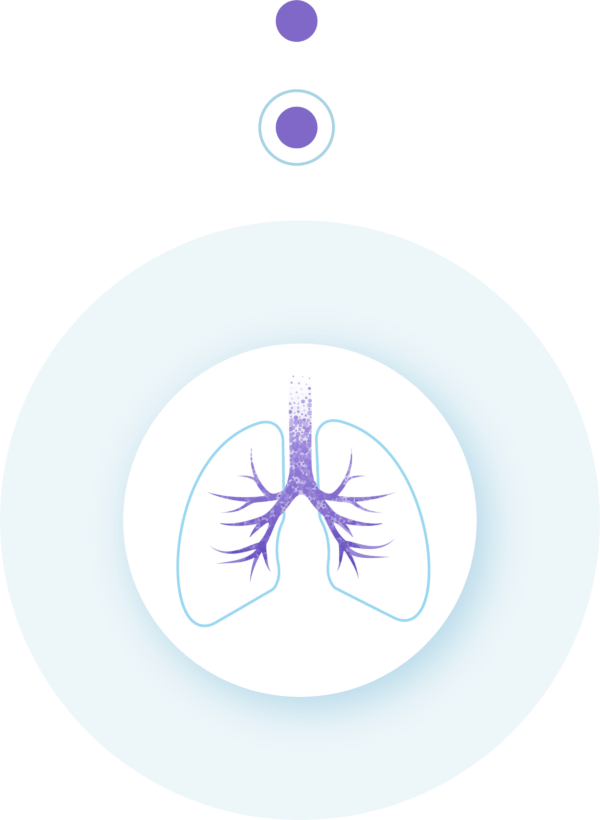| Design |
A Phase 3, Open Label, Multicenter, Randomized Study of First Line Tarlatamab in combination with Durvalumab, Carboplatin and Etoposide versus Durvalumab, Carboplatin and Etoposide in Untreated Extensive Stage Small-Cell Lung Cancer (DeLLphi-312)
|
| Intervention |
Tarlatamab in combination with durvalumab, carboplatin and etoposide for 4 cycles followed by tarlatamab and durvalumab, or durvalumab, carboplatin and etoposide for 4 cycles followed by durvalumab
|
| Key inclusion criteria |
- Participant has provided informed consent before initiation of any study-specific activities/procedures.
- Age ≥ 18 years or ≥ legal age within the country if it is older than 18 years.
- Histologically or cytologically documented extensive-stage small-cell lung cancer (American Joint Committee on Cancer, 2017, Stage IV SCLC [T any, N any, M1a/b/c]), or T3 to T4 due to multiple lung nodules that are too extensive or have tumor/nodal volume that is too large to be encompassed in a tolerable radiation plan.
- Measurable disease as defined per RECIST 1.1
- No prior treatment for SCLC.
Individuals whose disease has progressed after prior curative intent treatment for limited stage small-cell lung cancer (LS-SCLC) [i.e. chemoradiation therapy +/-anti PD-(L)1 consolidation, where approved] are eligible if 6 months or more have elapsed from end of all treatments and progression date, after consultation with medical monitor.
- Suitable to receive carboplatin, etoposide and durvalumab regimen as first-line treatment per investigator clinical assessment.
- Eastern Cooperative Oncology Group (ECOG) performance status (PS) of 0 or 1.
- Minimum life expectancy ≥ 12 weeks.
- Adequate organ function
- see list protocol
|
| Key exclusion criteria |
- Symptomatic central nervous system (CNS) metastases, or leptomeningeal disease.
· Participants with untreated brain metastases that are asymptomatic and do not require corticosteroids, nor local therapy per investigators standard of practice are eligible.
· Participants with treated brain metastases are eligible provided the following criteria are met:
- Radiation treatment was completed at least 2 weeks prior to first dose of study treatment (stereotactic radiosurgery completed at least 7 days prior to first dose of study treatment)
- Participant is clinically stable and on stable or decreasing doses of steroids (total daily dose ≤ 10 mg prednisone or equivalent) prior to first dose of study treatment
- Participant is off or on stable doses of anti-epileptic drugs at least 14 days prior to first dose of study treatment
- Any previous diagnosis of transformed non-small-cell lung cancer (NSCLC), epidermal growth factor receptor (EGFR) activating mutation positive NSCLC that has transformed to SCLC, or mixed SCLC NSCLC histology.
Participants with mixed histology tumors with predominant SCLC histology are allowed.
History of other malignancy within the past 2 years, with the following exceptions:
- Malignancy treated with curative intent before enrollment, with no known active disease and felt to be at low risk for recurrence by the treating physician, after discussion with the medical monitor.
- Adequately treated non-melanoma skin cancer or lentigo maligna without evidence of disease.
- Adequately treated cervical carcinoma in situ without evidence of disease.
- Adequately treated breast ductal carcinoma in situ without evidence of disease.
- Prostatic intraepithelial neoplasia without evidence of prostate cancer.
- Adequately treated urothelial papillary noninvasive carcinoma or carcinoma in situ.
Active or prior documented autoimmune or inflammatory disorders (including inflammatory bowel disease [eg, colitis or Crohn’s disease], systemic lupus erythematosus, sarcoidosis, granulomatosis with polyangiitis, Graves’ disease, rheumatoid arthritis, hypophysitis, uveitis, etc.), autoimmune pneumonitis, and autoimmune myocarditis. The following are exceptions to this criterion:
- Participants with vitiligo or alopecia.
- Participants with hypothyroidism (eg, following Hashimoto syndrome) stable on hormone replacement.
- Any chronic skin condition that does not require systemic therapy.
- Participants without active disease in the last 5 years may be included but only after consultation with the medical monitor.
- Participants with coeliac disease controlled by diet alone.
- Myocardial infarction and/or symptomatic congestive heart failure (New York Heart Association > class II) within 6 months prior to first dose of study treatment.
- History of arterial thrombosis (eg, stroke or transient ischemic attack) within 6 months prior to first dose of study treatment.
- Evidence of interstitial lung disease (ILD) or active, non-infectious pneumonitis.
- History of solid organ transplant.
- Major surgical procedures within 28 days prior to first dose of study treatment.
- Presence of active HIV or active hepatitis infection.
- History of allergic reactions or acute hypersensitivity reactions to antibody therapies, carboplatin, etoposide or pegfilgrastim
Participant with symptoms and/or signs of systemic infection requiring parental or
oral antibiotics within 7 days prior to the first dose of study treatment.
Prior/Concomitant Therapy
- Prior history of severe or life-threatening events from any immune-mediated therapy.
- Receiving systemic corticosteroid therapy or any other form of immunosuppressive therapy within 14 days prior to first dose of study treatment:
- Low-dose corticosteroids (prednisone ≤ 10 mg per day or equivalent is permitted during the study).
- Treatment with live virus, including live-attenuated vaccination, within 4 weeks prior to the first dose of study treatment. Inactive vaccines (eg, non-live or nonreplicating agent) and live viral non-replicating vaccines (eg, Jynneos for mpox infection) within 30 days prior to first dose of study treatment.
- Receiving another anticancer therapy. Adjuvant hormonal therapy for resected breast cancer is permitted.
- Has received or is planning to receive consolidative chest radiation, for extensive-stage disease
|





